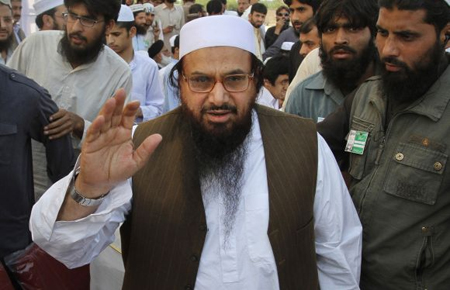
Islamabad, Jan 11: Lashkar-e-Taiba founder Hafiz Saeed, accused of masterminding the 2008 Mumbai massacre, said India was trying to destabilise Pakistan and predicted violence in Kashmir region could get "ugly".
"We do not want any force to be used or any military operation for this. But the Indians are opting for the other alternative," Saeed said in an interview on Friday.
Saeed founded Lashkar-e-Taiba (LeT) in the 1990s, the militant group which India blames for the rampage in Mumbai, where terrorists killed 166 people over three days. He denies any wrongdoing and links to militants.
He denied Indian press reports that he had been inciting action against the neighbouring country just before the recent outbreak of the worst violence in Kashmir since both neighbours agreed a ceasefire nearly a decade ago.
In the third fatal attack in Kashmir this week, a Pakistani soldier was killed on Thursday by "unprovoked" Indian fire, a Pakistan army spokesman said.
He was shot while manning a post in the Battal sector of Kashmir, which is split between the two sides by a heavily fortified border known as the Line of Control (LoC), the spokesman said.
Saeed accused India of trying to disrupt the peace process with Pakistan and dragging its feet on the long-standing issue of Kashmir.
"This is their usual practice. Betraying the international community and destabilising Pakistan," said Saeed. "And that's what they are doing this time."
India has repeatedly called on Pakistan to bring Saeed to justice, an issue that has stood in the way of rebuilding relations between the neighbours since the carnage in Mumbai.
India is furious that Pakistan has not detained Saeed since it handed over evidence against him to Islamabad. Washington has offered a reward of $10 million for information leading to Saeed's capture.






Comments
Add new comment